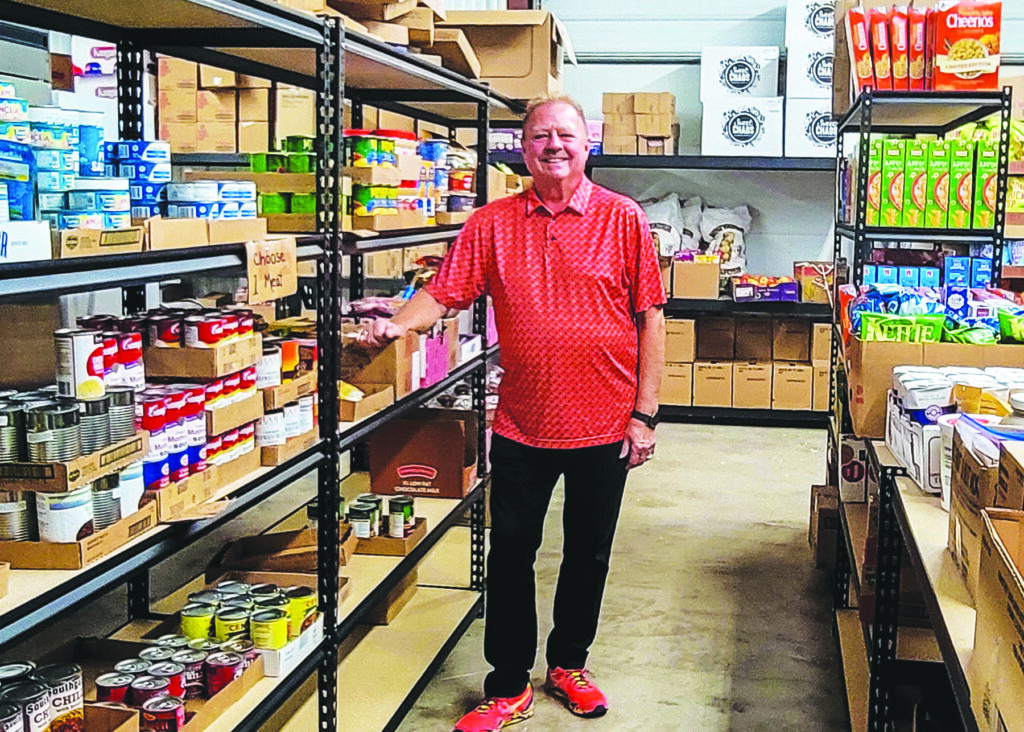Nancy Edmonds Hanson

Director Darrell Vasvick says the weekly food distribution begun for members of A Place For Hope last year during the Covid lockdown has become an ongoing program open to all who need food assistance. (Photo/Nancy Hanson)
When Covid-19 closed its doors last year, A Place for Hope – Clay County’s supportive social program for people with mental illness – became a place to help the hungry. Activities for adults living with serious mental illness had long filled its location at 2419 12th Ave. S. After the pandemic upended those gatherings and that mission, director Darrell Vasvick and his volunteers took on a new challenge: keeping food on the table for people now isolated at home.
Eighteen months later, the organization’s food pantry – supplied largely by the Great Plains Food Bank and Minnesota’s Emergency Food Assistance Program – has evolved far beyond its pandemic-based launch. Where its original target was members of the supportive social club, A Place for Hope’s food distribution program has now opened its doors to the whole community. Today, the expanded food shelf welcomes all those who need a helping hand. Hours are 11 a.m. to 3 p.m. Tuesday through Friday. While most patrons come from the Fargo-Moorhead area and Clay County, others travel from as far as Breckenridge and Detroit Lakes.
Despite promotion only on social media and by word of mouth, the pantry distributed more than 250,000 pounds of food between its launch in April 2020 and last December. Demand is still growing; last month’s volume, the highest so far, was 38,000 pounds.
Originally squeezed into A Place for Hope’s meeting rooms and offices, the supermarket-like layout now occupies its own 2,400-square-foot quarters on the west side of the building. Landlord Agassiz Valley Properties has made the space available rent-free. Why? “I guess they think we’re doing good things,” the director says.
“We don’t require any paperwork to qualify for groceries,” Vasvick reoirts. Nor are there income requirements or residency limits, even though much of the agency’s support comes from Clay County and neighboring Becker, Otter Tail and Wilkin counties. Patrons are welcome to come once every week.
The core mission of A Place for Hope is to provide “a safe, enriching and supportive recovery environment for adults living with a mental illness,” according to its brochure. Established through the Minnesota Comprehensive Mental Health Act, the community support day program is one of a suite of adult mental health services directed by the county. Clay County provides $60,000 per year in funding, an amount matched by the four-county BCOW consortium.
The Clay County Commission has also endorsed the food shelf. At last week’s meeting, commissioners voted to fund about $60,000 in improvements to the food shelf’s new, larger distribution area, including electrical and HVAC upgrades, shelving and two 10×12-foot walk-in storage facilities, one a cooler and the other a freezer.
Instead of receiving pre-filled cartons of food, visitors to A Place for Hope shop the well-stocked shelves themselves with the help of a volunteer. They choose the foods that fit their dietary preferences, ranging from fresh produce, potatoes and onions to bread and other bakery items and a wide selection of canned goods to frozen meats.
The freedom to choose according to their preferences, Vasvick points out, is especially important for some of the area’s New Americans, who may have very different tastes from their hotdish-loving neighbors. Along with their avoidance of pork, he points to dishes favored by other cultures that are made with dried beans, peas and lentils, as well the common preference for lamb, chicken and fish rather than beef. Clay County Extension’s SNAP educator Rosie Gonzalez also conducts nutrition and cooking classes every two weeks.
Meanwhile, members are slowly returning to A Place for Hope’s core program next door. About 180 of its 500 to 600 enrolled members (all diagnosed with severe and persistent mental illness) were active before the Covid lock-down. Activities are slowly resuming, Vasvick says, as people feel more comfortable socializing in person, from arts and crafts and playing cards and Bingo to building relationships with their peers and volunteers. He himself prepares a homemade lunch every day for members and volunteers.
Some 25 members of the community volunteer at the center; most are members of the Dilworth Lions and Lioness clubs and F-M Sertoma. Last month, the director says, they logged more than 800 hours of volunteer time, bringing this year’s running total close to 5,000.
Word of A Place for Hope’s food shelf has spread through word of mouth and social media. The site is not easy to find at the moment, since its outdoor sign was removed for construction along the 12th Avenue corridor and has not yet been replaced. To make a 15-minute appointment to visit the center, call 218-284-6069.


